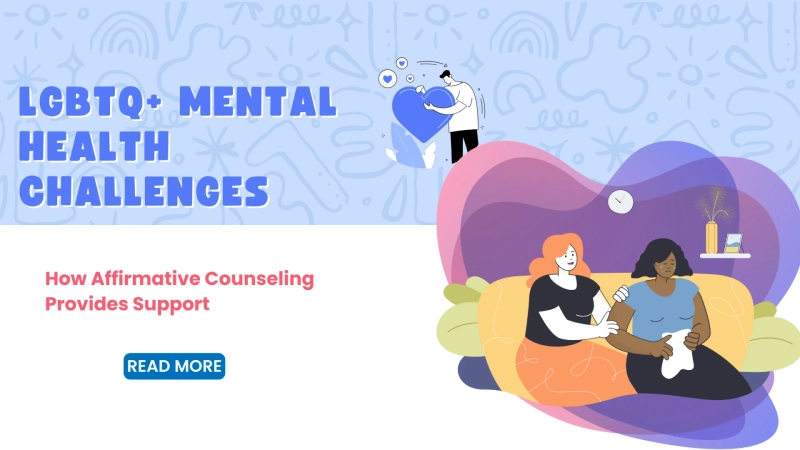
Introduction
Mental health is a vital part of overall well-being, yet many people in the LGBTQ+ community face unique challenges that impact their emotional, psychological, and social health. In places like Utah and Salt Lake City, where cultural and social dynamics can strongly influence identity and acceptance, these challenges often feel even heavier. Fortunately, LGBTQ+ Affirmative Counseling offers a supportive, understanding, and validating space to navigate these struggles.
This article explores the most common mental health challenges in the LGBTQ+ community and highlights how counseling can provide relief, empowerment, and healing.
Why Mental Health Matters in the LGBTQ+ Community
- Mental health issues are more prevalent among LGBTQ+ individuals due to discrimination, stigma, and social rejection.
- Research shows LGBTQ+ youth are at a higher risk of depression, anxiety, and suicidal thoughts compared to their heterosexual peers.
- For many, living authentically while facing societal judgment can create long-term emotional strain.
Top Mental Health Challenges in the LGBTQ+ Community

Suicidal Ideation Among LGBTQ+ Youth
Suicide rates among LGBTQ+ youth are disproportionately high, often linked to rejection, discrimination, and a lack of support systems. In Utah and Salt Lake City, these challenges can feel magnified where affirming spaces may be limited. Early access to supportive care, including LGBTQ+ Affirmative Counseling, can provide a lifeline by offering validation, coping strategies, and hope for a brighter future.
Anxiety and Depression
Anxiety and depression remain the most reported mental health concerns among LGBTQ+ individuals. In Utah and Salt Lake City, where community acceptance varies widely, individuals may feel pressure to hide their identities, which increases feelings of isolation and sadness. Accessing supportive resources, such as anxiety and depression counseling in Utah, can make a meaningful difference by helping individuals navigate these challenges with compassion, understanding, and practical coping strategies.
Minority Stress
Minority stress refers to the chronic stress faced by marginalized groups due to discrimination, prejudice, and social exclusion. This stress is often compounded for LGBTQ+ individuals who also belong to religious or cultural communities where acceptance is limited.
Coming Out Stress and Fear of Rejection
Coming out can be both liberating and terrifying. Many people worry about being rejected by family, friends, or faith communities. This fear often leads to secrecy, self-doubt, and mental health struggles.
Bullying and Harassment
Both youth and adults in the LGBTQ+ community face bullying, harassment, or workplace discrimination. The emotional toll of being targeted can trigger post-traumatic stress symptoms, low self-esteem, and even substance use.
Internalized Homophobia and Shame
Some individuals internalize negative beliefs from society, religious groups, or family expectations. This can lead to feelings of shame, identity conflict, and difficulty forming healthy relationships.
How LGBTQ+ Affirmative Counseling Helps
Creating a Safe and Affirming Space
Affirmative counseling provides a non-judgmental environment where individuals feel accepted for who they are. For residents of Salt Lake City and across Utah, this type of counseling helps reduce feelings of isolation by validating personal identity.
Addressing Trauma and Building Resilience
Counseling helps process traumatic experiences such as bullying, family rejection, or discrimination. Affirmative therapists guide clients through healing while also teaching coping strategies to build resilience.
Supporting Healthy Relationships
Whether with family, partners, or peers, relationships can be complicated for LGBTQ+ individuals. Counseling provides communication tools, boundary-setting strategies, and ways to strengthen emotional bonds.
Encouraging Self-Acceptance and Confidence
Affirmative counseling helps clients replace shame and self-doubt with self-love and confidence. For many in Utah, where societal pressures can be strong, this can be transformative.
Offering Guidance for Coming Out
A supportive counselor can guide individuals through the coming-out process at their own pace, offering coping strategies for managing difficult reactions from loved ones or communities.
Local Context: Mental Health Support in Utah and Salt Lake City
- Utah has made progress in expanding access to mental health resources, but many LGBTQ+ individuals still struggle to find affirming care.
- In Salt Lake City, more inclusive resources are becoming available, creating safe spaces where individuals can thrive.
- Talking about these challenges openly helps reduce stigma and ensures that LGBTQ+ voices are heard within the broader conversation about mental health.
Breaking the Stigma Around LGBTQ+ Counseling
Despite progress, many still view counseling as a sign of weakness or unnecessary. In reality, seeking help is a courageous act of self-care. For the LGBTQ+ community, counseling isn’t just about treating mental health—it’s about reclaiming identity, building resilience, and creating a fulfilling life.
Conclusion
The LGBTQ+ community faces unique mental health challenges, from anxiety and depression to discrimination and identity struggles. In Utah and Salt Lake City, these challenges can feel magnified due to cultural and social dynamics. LGBTQ+ Affirmative Counseling offers a path toward healing, empowerment, and acceptance by providing safe, supportive, and validating care.
Prioritizing mental health isn’t just important—it’s essential. By breaking stigma, embracing counseling, and supporting one another, individuals in the LGBTQ+ community can move toward stronger mental well-being and a brighter future.



